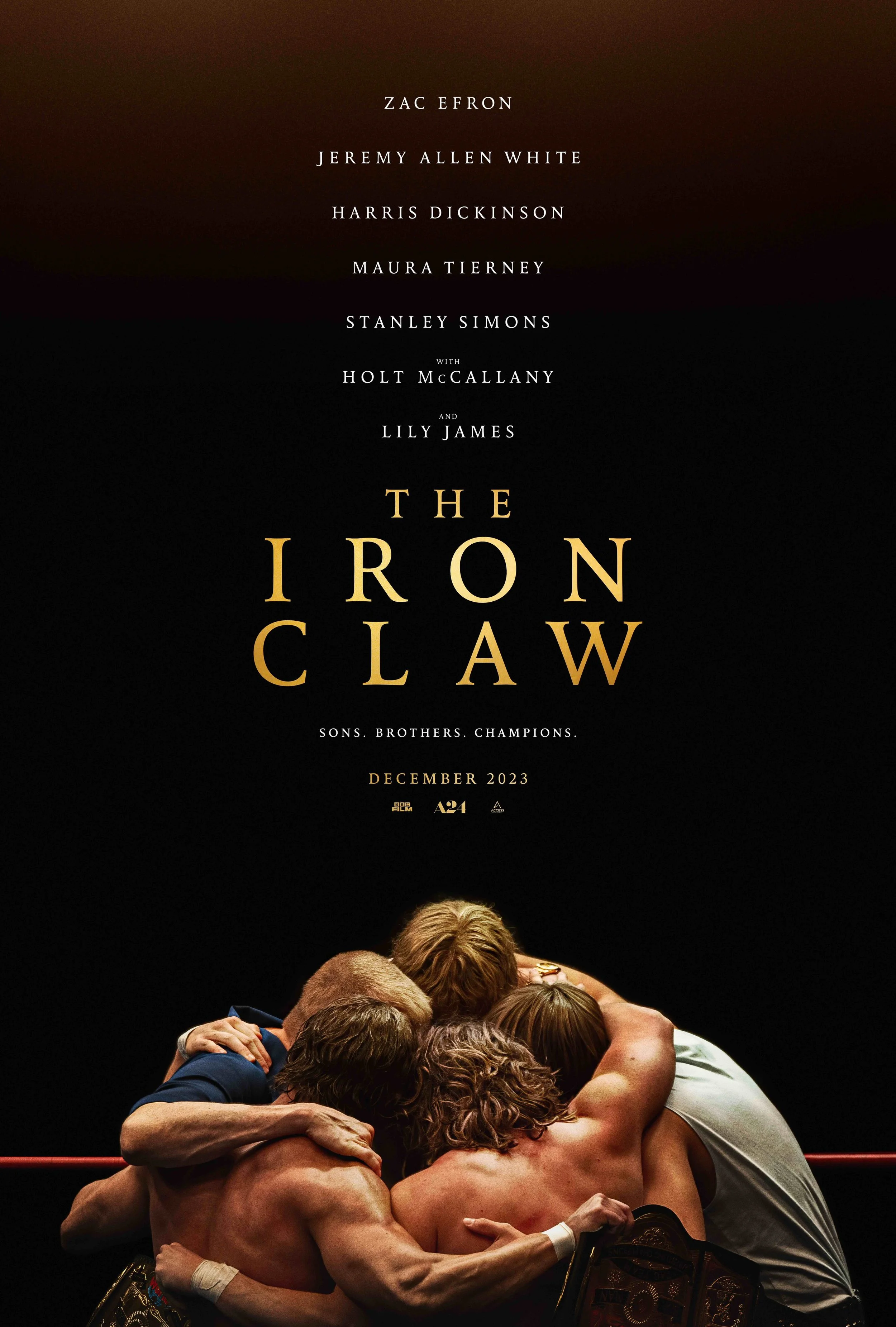'The Iron Claw' Has A Tight Grip
Have you ever heard of the Von Erich brothers? They were an inseparable family who fought to obtain the National Wrestling Alliance (NWA) belt. They were some of the best wrestlers in the NWA in the 1980s and their name lives on today. The overdemanding father, Fritz Von Erich (Holt McCallany), shapes his sons into the best athletes he can raise. The saga of the Von Erichs starts as an inspirational sports story that takes a 180-degree turn halfway through the movie. The picture is a classic tale of daddy issues. That's not to say that's a criticism. When it's written well, it works.
Writer/Director Sean Durkin takes his time with this story. For much of it, in the beginning feels like just another inspirational sports flick. There's the competitive brothers, the strict father who coaches them, and the love interest. All formula's we've seen from other films. It's the typical story of a family who work together to achieve a dream. Inspirational sports stories are great, but they're overplayed. We know the outcome of the film miles ahead of where it's going. The genre worked for a certain time, but the public caught up with its trite conventions.
The Iron Claw isn't just another conventional sports story. It takes a turn for the worst for its characters. The Von Erichs experience tragedy after tragedy. According to Kevin (Zac Efron), his family is cursed. Kevin tells his wife, Pam (Lily James), that when he was a kid, something horrible happened to him that made him think his family might have bad luck. To protect his son, he gives him his real last name, Adkisson, when legally naming the child. When things go wrong for the Von Erichs is when the film is the most gripping. It's filled with moments of shock, grief, and anger.
There were times I wanted to shout at the screen and was shocked at other instances. If you want me to spoil the movie, you can easily do a Google search on the Von Erich family and see what happened to them. But it's best to go in fresh as the film's unexpected turns will move you. Having a vague understanding of the family, I was waiting for the film to turn gears. For a while, the movie appears to go nowhere, but when it does get into the meat of the family's misfortunes, it's some emotionally gripping territory.
Helming the film is Zac Efron, who's almost unrecognizable in this film. Efron bulked up to an incredible degree. When not in the ring, Efron must act. The range Efron gives is admirable. He displays a withdrawn individual. Often, Efron plays the wounded puppy in the way he presents himself to Pam. He's shy in his delivery, bottling up all his rage for the ring. When Efron has to deliver the big crying or outburst scenes, he does so without over or under-acting them.
Kevin doesn't like to get sad or angry in private. When terrible things happen to him, he expresses his emotions by lying in bed motionless, not shedding a tear. Men aren't supposed to cry, according to Fritz. Crying is a weakness. Even when the brothers should express grief, Fritz commands they don't. Most films would depict Fritz as an abusive, loveless father. In many ways, he is. He jests about which son is his favorite, and he pushes his children beyond the brink to make them winners. He shows little room for compassion. But he's not heartless.
There's a methodology to Fritz's actions. Fritz never made it as an athlete but wants his boys to finish what he couldn't. Vicariously living his dreams through his children, Fritz achieves a comfortable home for his family to live in, thanks to the collective accomplishments of his boys. Before the boys entered wrestling, the resources available for Fritz's family were minimal. He had no real house or sustainable income. If not for the brother's successes, the family would still be broke. Fritz is a tight ass, but he did earn a living for his family. But how long can the success last until there's a downfall?
The film's opening is a warning for things to come. The shot is in black and white. We see a wrestling ring being clouded in fog as Ominous music plays. Through its mildly haunting mise en scène, Sean Durking hints that what you're about to see is not going to be an uplifting story. Yet, in many respects, it is. Although befuddled with adversity, the Von Erich family presses on. The Iron Claw is inspiring and heartbreaking. It does take a while for its grip to get on you. But once it does, it won't want to let go. If you haven't a clue who the Von Eichs are, then you're not only in for a wrestling historical lesson, but also a heartwrenching tale.
The movie is, by all accounts, a by the book's conventional film that uses its conventionality to its advantage. The flick lacks some conflict in the beginning but is intentionally withdrawn from drama as the middle act hits you like a chair to the back of the head. The Iron Claw is a heartfelt tale about what happens when we take our dreams too far. Does that fame buy us happiness, or are we still miserable after we've achieved everything? Underneath all its brand of success, the story of this film is about a man who wants to earn enough wealth to raise a family. To earn a comfortable living means sacrifice. Whether it be your body or your time, success comes through blood, sweat, and tears. The Iron Claw is one of those narratives of achievement and the dangers that come with it. It's a harrowing tale with a strong lead performance that's a champion of a film and one of the best pictures of the year.



